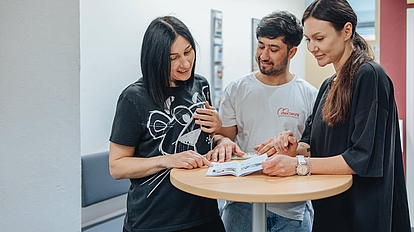Integration Courses Hannover - Learn German, experience Germany
You have the choice between general integration courses and courses teaching you how to read and write. All courses end with an orientation course and the final LiD (Leben in Deutschland = Living in Germany) examination and the DTZ (German Test for Immigrants).
Who can enroll in an integration course?
- Late repatriates and new immigrants with permanent residence status
- Immigrants who have been living in Germany for a longer period, citizens of the European Union and other Germans with special integration needs
- Asylum seekers with good prospects of staying, tolerated persons with a residence permit according to § 60a paragraph 2 sentence 3 AufenthG and holders of a residence permit according to § 25 paragraph 5 AufenthG
- Asylum seekers who are active on or available to the labor market with unclear prospects of remaining in Germany, if they entered the country before August 1, 2019 and have been permitted to stay in Germany for at least three months
Because the Residence Act has different rules as to who is permitted to participate, we will be happy to provide you with more detailed information by telephone or here in the ISK during your advising session.
How long is an integration course?
| General integration course | 600 hours | + 100 hours orientation course |
| Course repetition | 300 hours | |
| Reading and writing course | 900 hours | + 100 hours orientation course |
| Youth integration course | 900 hours | + 100 hours orientation course |
What is the aim of an integration course?
The aim is to promote the integration of immigrants in terms of social participation and equal opportunities. The language course teaches the participants a command of the German language at B1 level of the Common European Framework of Reference for Languages (CEFR). Language skills are important for finding work, filling out applications or being able to communicate in everyday life. The orientation course focusses on teaching the German legal system, the history and culture of Germany as well as German values and customs.
Which examinations are taken in the integration courses?
Integration courses end with two final examinations – the DTZ – German Test for Immigrants (A2/B1 level) and the “Living in Germany” test. Both examinations are offered regularly at the ISK.
Who pays for the integration course?
Cost Exemption
Integration courses are free of charge for students who:
- receive unemployment benefits (Bürgergeld) or welfare payments
- receive financial benefits or waivers from another source due to unreasonable hardship (e.g. housing benefit, exemption from GEZ fees)
Please feel free to make an appointment for an advising session in our office. This advising session is free of charge. We can help you with the application process, an application for a cost exemption, and any questions you may have about applying for travel expenses.
What is the aim of a reading and writing course?
The literacy course promotes the integration of immigrants in terms of social participation and equal opportunities. The aim of the literacy course is to bring participants as close as possible to functional literacy and to impart German skills up to level A2.2/B1. The literacy course is followed by the orientation course. The orientation course focusses on teaching the German legal system, the history and culture of Germany as well as German values and customs.
Team teaching
During team teaching in literacy courses, two teachers teach at the same time in a course, so that the participants in small groups (3-4 people) specifically repeat and consolidate what they have learned, practice their pronunciation or prepare for the exam.
Which examinations are taken in the reading and writing courses?
Reading and writing courses end with two final examinations – the DTZ – German Test for Immigrants (A2/B1 level) and the “Living in Germany” test. Both examinations are offered regularly at the ISK.
Who pays for the reading and writing course?
Cost Exemption
Reading and writing courses are free of charge for students who:
- receive unemployment benefits (Bürgergeld) or welfare payments
- receive financial benefits or waivers from another source due to unreasonable hardship (e.g. housing benefit, exemption from GEZ fees)
Please feel free to make an appointment for an advising session in our office. This advising session is free of charge.
Who can enroll in an orientation course?
- Late repatriates and new immigrants with permanent residence status
- Immigrants who have been living in Germany for a longer period, citizens of the European Union and other Germans with special integration needs
- Asylum seekers with good prospects of staying, tolerated persons with a residence permit according to § 60a paragraph 2 sentence 3 AufenthG and holders of a residence permit according to § 25 paragraph 5 AufenthG
- Asylum seekers who are active on or available to the labor market with unclear prospects of remaining in Germany, if they entered the country before August 1, 2019 and have been permitted to stay in Germany for at least three months
Because the Residence Act has different rules as to who is permitted to participate, we will be happy to provide you with more detailed information by telephone or here in the ISK during your advising session.
How long is an orientation course?
The orientation course consists of 100 lessons. In the ISK, you have 4 hours a day, i.e. it takes about 5 weeks to complete the course.
What is the aim of an orientation course?
Topics in the orientation course include the German legal system, history and culture.
Which examinations are taken after completing an orientation course?
The orientation course is part of the integration course, it concludes with the Living in Germany test (LiD). The LiD takes place regularly at the ISK. Information on the requirements for the LiD can be found on our exam page.
Who pays for the orientation course?
Cost Exemption
The orientation course is free of charge for students who:
- receive unemployment benefits (Bürgergeld) or welfare payments
- receive financial benefits or waivers from another source due to unreasonable hardship (e.g. housing benefit, exemption from GEZ fees)
Please feel free to make an appointment for an advising session in our office. This advising session is free of charge.
Placement | Consultation
Every participant is invited to take a placement test free of charge. We conduct a personal conversation with you to learn more about your language level and your goals. That way, we ensure that you get the course that corresponds to your current language skills. We can help you to fill out your application, to apply for a costs exemption and will answer your questions regarding travel costs.
Fit for Naturalization
At the end of the integration course, you can write the German Test for Immigrants (Deutschtest für Zuwanderer – DTZ). This test can be taken at the ISK on a specific date every month. If you pass the DTZ successfully, you can use this as proof of your language skills at the A2 and B1 levels. The completion of the B1 level is proof of the language proficiency you require to become a German citizen. As the last part of the integration course, you attend the orientation course, which you complete by writing the “Living in Germany” test (Leben in Deutschland). The orientation course prepares you well to take this test. If you are able to answer 17 of the 33 questions correctly, you will have passed the naturalization test and receive a certificate documenting your knowledge of the German legal system and social order. Then there will be nothing more standing in the way of you becoming a German citizen.
Special counseling
Special counseling assists participants in our integration courses in the learning process. Our qualified social workers discuss your learning situation with you and help you develop strategies to improve your German language skills.
Participants can obtain information about support services in person or via video conference. The qualified social workers at the ISK will support you in problem situations and with any everyday questions you might have.
Migration advising
In cooperation with the Migration Advisory Centers of the Hannover region, the AWO, Caritas, the Diakonisches Werk and the Landsmannschaft der Deutschen aus Russland (for Germans coming from Russia), we offer a specially supported advising session once a week. The specially trained staff from the Migration Advisory Centers advise and support you in everyday questions, financial and family problems and accompany you during your integration into German society and the German job market.
Office hours: Thursday from 11.00 to 13.00 at Lange Laube 3, Telephone 0511-12356360
You can find all the relevant forms and leaflets on the website of the Federal Office for Migration and Refugees.
telc provides information and practice materials for the DTZ.
The BAMF provides a sample questionnaire, a question catalog, and a complete question catalog in PDF format to help you prepare for the LiD test.



![[Translate to Englisch:] Integrationskurse [Translate to Englisch:] Integrationskurse](/fileadmin/_processed_/8/a/csm_Alpha_129ecda3d1.jpg)


![[Translate to Englisch:] Integrationskurse [Translate to Englisch:] Integrationskurse](/fileadmin/_processed_/b/a/csm_Orientierungskurs_e7b8e6b6c0.jpg)
